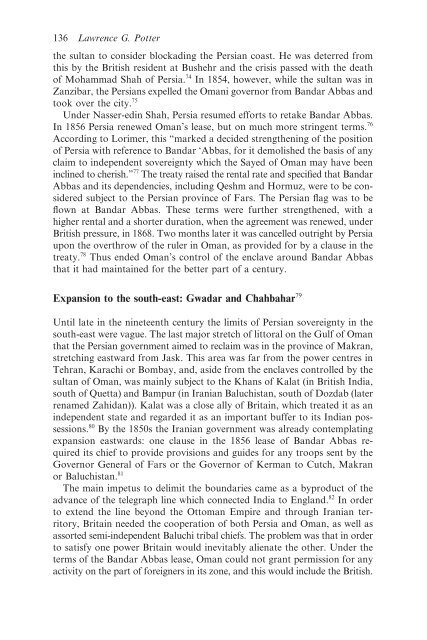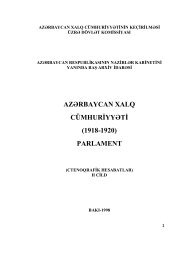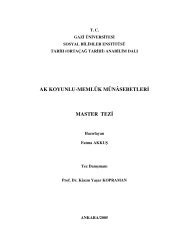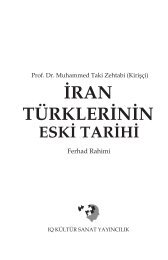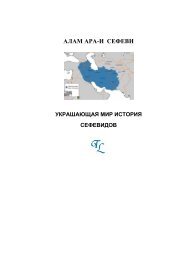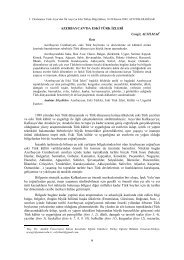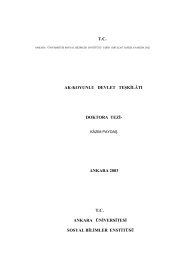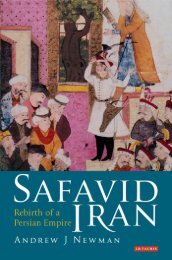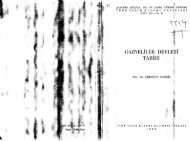War and Peace in Qajar Persia: Implications Past and ... - Oguzlar.az
War and Peace in Qajar Persia: Implications Past and ... - Oguzlar.az
War and Peace in Qajar Persia: Implications Past and ... - Oguzlar.az
- No tags were found...
You also want an ePaper? Increase the reach of your titles
YUMPU automatically turns print PDFs into web optimized ePapers that Google loves.
136 Lawrence G. Potterthe sultan to consider blockad<strong>in</strong>g the <strong>Persia</strong>n coast. He was deterred fromthis by the British resident at Bushehr <strong>and</strong> the crisis passed with the deathof Mohammad Shah of <strong>Persia</strong>. 74 In 1854, however, while the sultan was <strong>in</strong>Zanzibar, the <strong>Persia</strong>ns expelled the Omani governor from B<strong>and</strong>ar Abbas <strong>and</strong>took over the city. 75Under Nasser-ed<strong>in</strong> Shah, <strong>Persia</strong> resumed efforts to retake B<strong>and</strong>ar Abbas.In 1856 <strong>Persia</strong> renewed Oman’s lease, but on much more str<strong>in</strong>gent terms. 76Accord<strong>in</strong>g to Lorimer, this “marked a decided strengthen<strong>in</strong>g of the positionof <strong>Persia</strong> with reference to B<strong>and</strong>ar ‘Abbas, for it demolished the basis of anyclaim to <strong>in</strong>dependent sovereignty which the Sayed of Oman may have been<strong>in</strong>cl<strong>in</strong>ed to cherish.” 77 The treaty raised the rental rate <strong>and</strong> specified that B<strong>and</strong>arAbbas <strong>and</strong> its dependencies, <strong>in</strong>clud<strong>in</strong>g Qeshm <strong>and</strong> Hormuz, were to be consideredsubject to the <strong>Persia</strong>n prov<strong>in</strong>ce of Fars. The <strong>Persia</strong>n flag was to beflown at B<strong>and</strong>ar Abbas. These terms were further strengthened, with ahigher rental <strong>and</strong> a shorter duration, when the agreement was renewed, underBritish pressure, <strong>in</strong> 1868. Two months later it was cancelled outright by <strong>Persia</strong>upon the overthrow of the ruler <strong>in</strong> Oman, as provided for by a clause <strong>in</strong> thetreaty. 78 Thus ended Oman’s control of the enclave around B<strong>and</strong>ar Abbasthat it had ma<strong>in</strong>ta<strong>in</strong>ed for the better part of a century.Expansion to the south-east: Gwadar <strong>and</strong> Chahbahar 79Until late <strong>in</strong> the n<strong>in</strong>eteenth century the limits of <strong>Persia</strong>n sovereignty <strong>in</strong> thesouth-east were vague. The last major stretch of littoral on the Gulf of Omanthat the <strong>Persia</strong>n government aimed to reclaim was <strong>in</strong> the prov<strong>in</strong>ce of Makran,stretch<strong>in</strong>g eastward from Jask. This area was far from the power centres <strong>in</strong>Tehran, Karachi or Bombay, <strong>and</strong>, aside from the enclaves controlled by thesultan of Oman, was ma<strong>in</strong>ly subject to the Khans of Kalat (<strong>in</strong> British India,south of Quetta) <strong>and</strong> Bampur (<strong>in</strong> Iranian Baluchistan, south of Dozdab (laterrenamed Zahidan)). Kalat was a close ally of Brita<strong>in</strong>, which treated it as an<strong>in</strong>dependent state <strong>and</strong> regarded it as an important buffer to its Indian possessions.80 By the 1850s the Iranian government was already contemplat<strong>in</strong>gexpansion eastwards: one clause <strong>in</strong> the 1856 lease of B<strong>and</strong>ar Abbas requiredits chief to provide provisions <strong>and</strong> guides for any troops sent by theGovernor General of Fars or the Governor of Kerman to Cutch, Makranor Baluchistan. 81The ma<strong>in</strong> impetus to delimit the boundaries came as a byproduct of theadvance of the telegraph l<strong>in</strong>e which connected India to Engl<strong>and</strong>. 82 In orderto extend the l<strong>in</strong>e beyond the Ottoman Empire <strong>and</strong> through Iranian territory,Brita<strong>in</strong> needed the cooperation of both <strong>Persia</strong> <strong>and</strong> Oman, as well asassorted semi-<strong>in</strong>dependent Baluchi tribal chiefs. The problem was that <strong>in</strong> orderto satisfy one power Brita<strong>in</strong> would <strong>in</strong>evitably alienate the other. Under theterms of the B<strong>and</strong>ar Abbas lease, Oman could not grant permission for anyactivity on the part of foreigners <strong>in</strong> its zone, <strong>and</strong> this would <strong>in</strong>clude the British.


